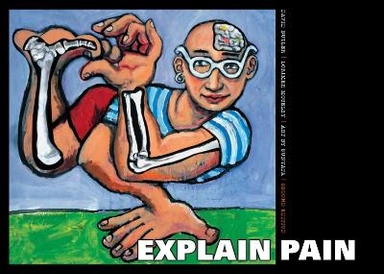Solid evidence now shows that knowing why we hurt will help us heal.
All pain is real, and for many people it is a debilitating part of everyday life. In a world where 1 in 5 of us experience ongoing pain and where there is increasing evidence for the failure of synthetic drugs, take heart: help is at hand. It is now known that understanding more about why things hurt can actually help treat pain.
Recent advances in fields such as neurophysiology, brain imaging, immunology, psychology and cellular biology have provided an explanatory platform from which to explore pain. In everyday language accompanied by quirky illustrations, Explain Pain Second Edition discusses how pain responses are produced by the brain, how responses to injury from the autonomic motor and immune systems in your body contribute to pain, and why pain can persist after tissues have had plenty of time to heal.
Co-author Dr David Butler, founder of the Neuro Orthopaedic Institute, says that "it is no longer acceptable that pain be just managed: we must expect that it can be treated, and sufferers can alter it themselves through education."
Explain Pain has sold around 60,000 copies world-wide in 5 languages and continues to inspire clinical research and multidisciplinary pain treatment globally. Explain Pain aims to give people in pain the power to challenge pain and to consider new models for viewing what happens to your body and brain during pain. Once they have learnt about the processes involved they can follow a scientific route to recovery.
Why a second edition?
A decade of scientific research is a lot – and we need to keep on top of it.
In the last 10 years there has been increasing support for therapeutic neuroscience education from clinical trials, educational science, neuroscience, plain logic and the failure of drug therapy on chronic pain outcomes. Lorimer and David have subtly changed some of the language so that the second edition can be delivered with much more authority than the first.
Noigroup Publications (2013), 133 pages, 90+ illustrations and diagrams, half-canadian wire bound. ISBN: 978-0-9873426-6-9
Authors: Dr David S. Butler and Prof G. Lorimer Moseley.
Åtkomstkoder och digitalt tilläggsmaterial garanteras inte med begagnade böcker





















